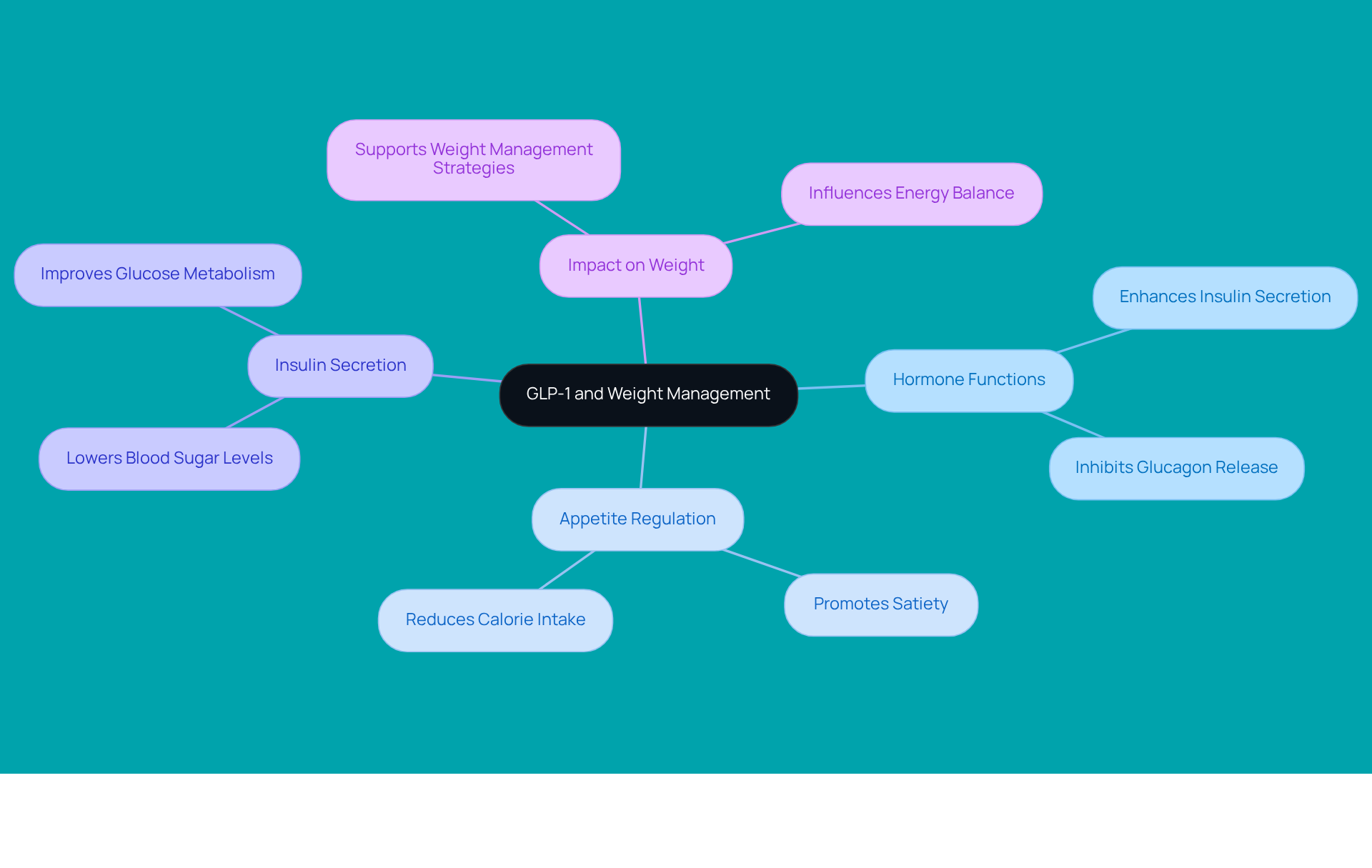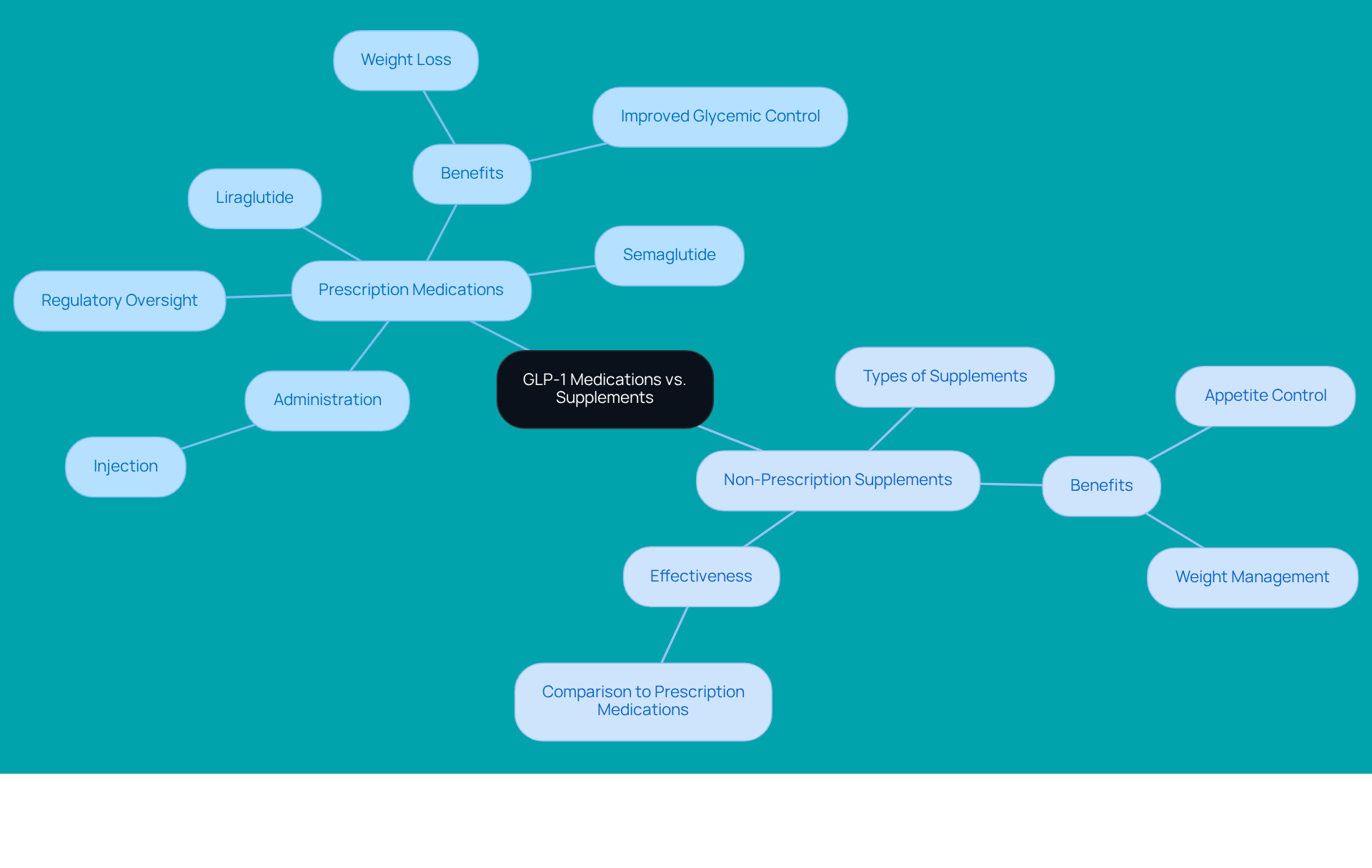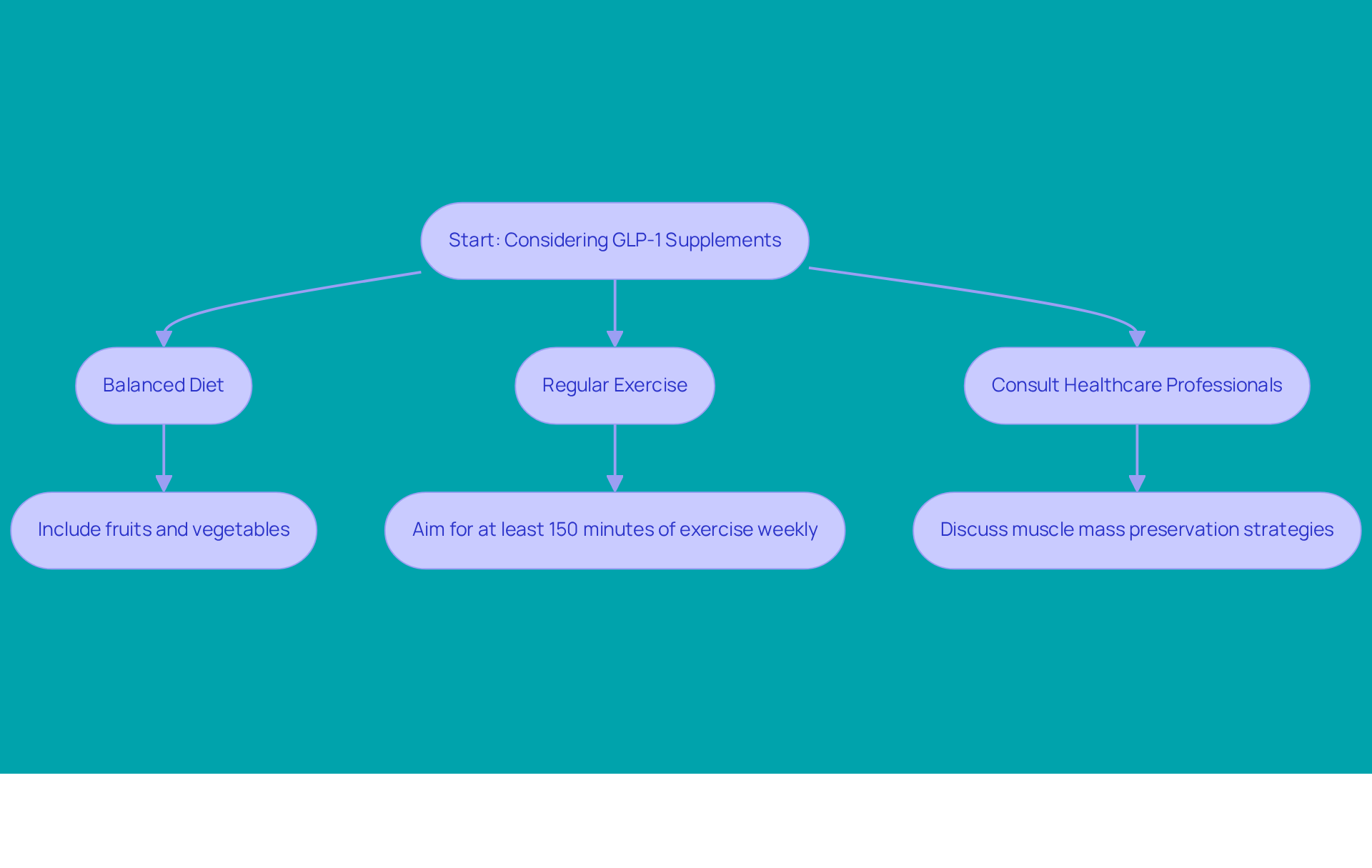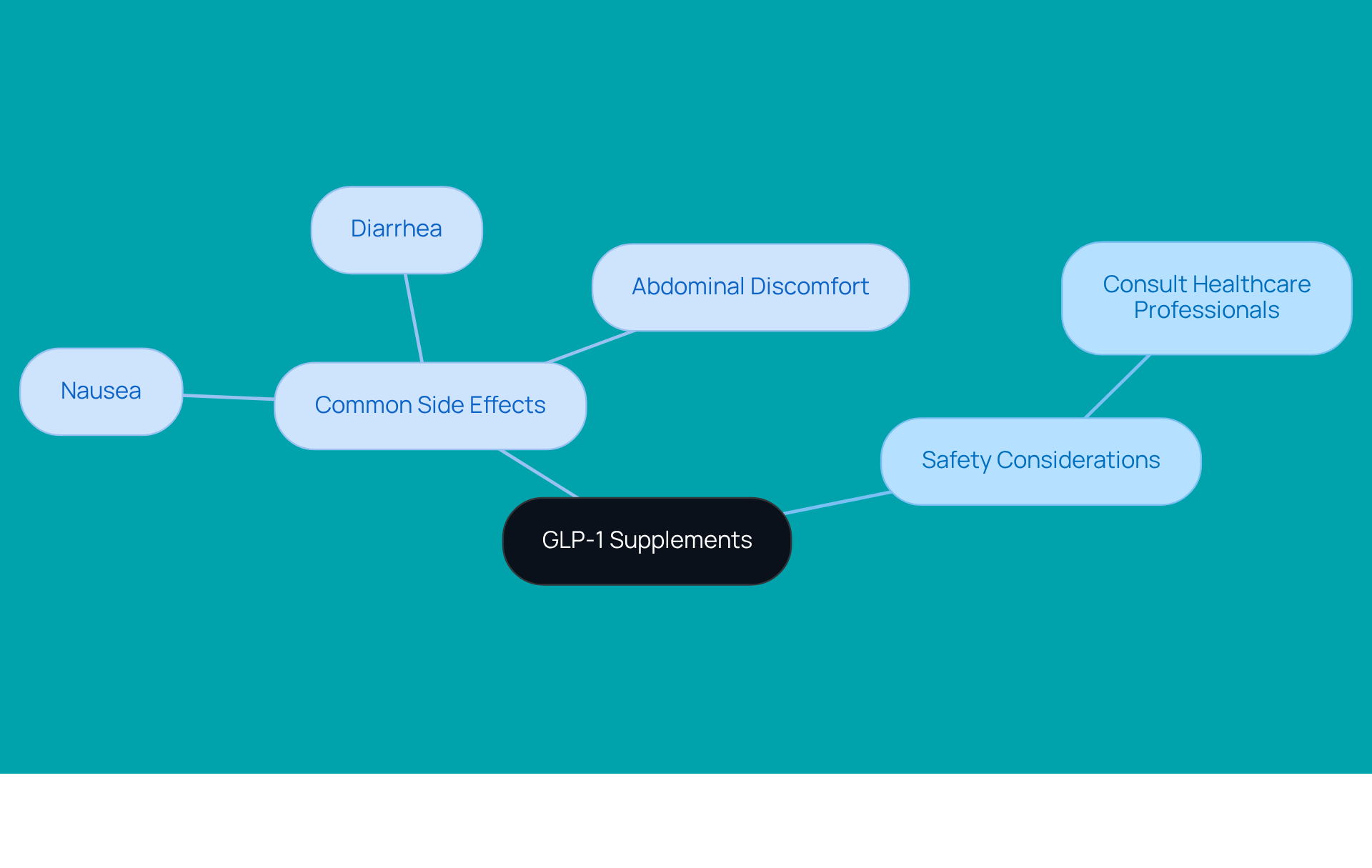Overview
Are you looking for ways to support your weight management journey? GLP-1 supplements might be a helpful option for you. These supplements are designed to enhance your body's natural production of glucagon-like peptide-1, a hormone that plays a crucial role in regulating appetite and glucose metabolism.
Imagine feeling more satisfied after meals and finding it easier to make healthier choices. While GLP-1 supplements can indeed help increase feelings of satiety and support weight loss, it’s important to remember that they work best when combined with a balanced diet and regular exercise. You might be wondering if these supplements are right for you. While they can be beneficial, they may not be as effective as prescription medications, and it's essential to approach them with caution regarding potential side effects.
Together, we can explore the best options for your wellness journey. Consider discussing with a healthcare professional to see if GLP-1 supplements align with your goals. Remember, taking steps towards a healthier lifestyle is a journey, and you don’t have to navigate it alone.
Introduction
Understanding the mechanisms behind appetite regulation and weight management is more important than ever, especially as so many of us face the challenges of rising obesity rates globally. You may be wondering how to navigate this complex landscape.
GLP-1, or Glucagon-Like Peptide-1, emerges as a pivotal hormone in this discussion, influencing not only appetite but also glucose metabolism. This article will explore GLP-1 supplements, shedding light on their potential benefits, the differences between these supplements and prescription medications, and the latest research on their effectiveness.
However, as we consider the promise of weight loss, it's natural to have questions about safety and the real impact these supplements may have on your health journey. Together, let’s explore how you can make informed decisions that align with your wellness goals.
Define GLP-1: Understanding Its Role in Weight Management
Glucagon-Like Peptide-1 is a hormone produced in our intestines, playing a vital role in regulating appetite and glucose metabolism. When we eat, it is released, enhancing insulin secretion while inhibiting glucagon release, ultimately lowering blood sugar levels. This is particularly important for those of us managing body mass, as it encourages a sense of satiety, helping us feel full and reducing overall calorie intake.
Imagine if you could rely on your body to signal when it’s time to stop eating. This hormone's ability to influence appetite and energy balance makes it a key player in discussions about obesity and effective strategies for weight management. By understanding how it works, we can take meaningful steps towards our wellness goals together.
As you navigate your journey, remember that you’re not alone. Fostering awareness about how our bodies respond to food can empower us to make healthier choices. Let’s embrace this knowledge and support one another in achieving our health aspirations.

Differentiate GLP-1 Medications from Supplements: What You Need to Know
Liraglutide and semaglutide are prescription medications designed to support individuals managing type 2 diabetes and obesity. By mimicking the effects of a specific hormone in the body, these medications can offer significant benefits. Administered through injection, they have been clinically proven to aid in weight loss and improve glycemic control.
You might be wondering about alternatives. In contrast, some GLP-1 supplements are available without a prescription and aim to enhance the body's natural production of this peptide. While these enhancements, such as GLP-1 supplements, can provide benefits in appetite control and weight management, it's important to note that they may not match the effectiveness or regulatory oversight of prescription medications.
Understanding these differences is crucial as you navigate your health journey. It empowers you to make informed choices that align with your wellness needs. Together, we can explore the best options for your health, ensuring you feel supported every step of the way.

Evaluate the Effectiveness of GLP-1 Supplements: Insights from Research
Recent studies on these compounds suggest an exciting possibility: GLP-1 supplements may help increase feelings of satiety and reduce food consumption. Have you ever felt overwhelmed by hunger while trying to manage your weight? Initial research shows that individuals using GLP-1 supplements often report a significant decrease in hunger, leading to greater fat reduction compared to those who do not use these supplements. For example, a recent clinical study highlighted that participants experienced a considerable decrease in caloric intake, resulting in an average loss of 5-10% over several months.
However, it’s important to remember that individual responses can vary widely. Factors such as diet, lifestyle, and overall health play a crucial role. Experts caution that while GLP-1 supplements may assist in managing appetite, they should not be viewed as standalone solutions. As Samar Hafida, Vice President of the Obesity Association, wisely states, "As we enter a new era of obesity treatments, it’s vital to focus not just on the amount of mass lost, but on preserving muscle and gaining the health benefits that result from treating obesity."
So, how can you make the most of these additions? They are most effective when integrated into a comprehensive weight management plan that includes:
- A balanced diet
- Regular exercise
Additionally, it’s essential to consider potential risks, such as muscle mass loss, which may occur with this therapy. As you embark on this journey, remember to maintain realistic expectations and consult with healthcare professionals who can help tailor your approach to your unique health goals. Together, we can navigate this path towards better health.

Assess Safety and Side Effects of GLP-1 Supplements: What to Consider
While glp 1 supplements are generally regarded as safe for most individuals, it's important to recognize that potential side effects can occur. You might be wondering what these could be. Commonly reported side effects include:
- gastrointestinal issues such as nausea
- diarrhea
- abdominal discomfort
It’s essential to consult with healthcare professionals before starting any new supplement, particularly glp 1 supplements, especially if you have pre-existing health conditions or are taking other medications.
Imagine if you could navigate this journey with confidence. Being cautious of products that make exaggerated claims about weight loss is crucial, as these may not be backed by scientific evidence. A thorough understanding of safety and side effects can empower you to make choices that truly align with your health goals. Together, let’s take the next step in your wellness journey with informed decisions and supportive guidance.

Conclusion
Understanding GLP-1 supplements is essential for health-conscious consumers like you who are seeking effective strategies for weight management. These supplements enhance the body’s natural production of the GLP-1 hormone, playing a significant role in regulating appetite and glucose metabolism. By exploring the nuances between GLP-1 medications and supplements, you can make informed choices that align with your health goals.
Throughout this article, we’ve examined key aspects of GLP-1 supplements, including:
- Their effectiveness in promoting satiety
- The differences between prescription medications and over-the-counter options
- The importance of integrating these supplements into a comprehensive weight management plan
Additionally, we’ve highlighted safety considerations and potential side effects, emphasizing the need for careful evaluation and professional guidance.
Ultimately, the journey toward better health is a collaborative effort. Imagine if you embraced knowledge about GLP-1 and its impact on appetite and metabolism. By doing so, you can take proactive steps in your wellness journey. Making informed decisions, consulting healthcare professionals, and maintaining a balanced approach to diet and exercise will empower you to achieve your health aspirations while navigating the complexities of weight management. Together, we can support each other in this endeavor.
Frequently Asked Questions
What is GLP-1?
GLP-1, or Glucagon-Like Peptide-1, is a hormone produced in the intestines that plays a crucial role in regulating appetite and glucose metabolism.
How does GLP-1 affect appetite and calorie intake?
GLP-1 is released when we eat, enhancing insulin secretion and inhibiting glucagon release, which lowers blood sugar levels. It promotes a sense of satiety, helping individuals feel full and reducing overall calorie intake.
Why is GLP-1 important for weight management?
GLP-1 influences appetite and energy balance, making it a significant factor in discussions about obesity and effective weight management strategies.
How can understanding GLP-1 help individuals with their wellness goals?
By understanding how GLP-1 works, individuals can take meaningful steps towards their wellness goals, fostering awareness about their bodies' responses to food and empowering healthier choices.




